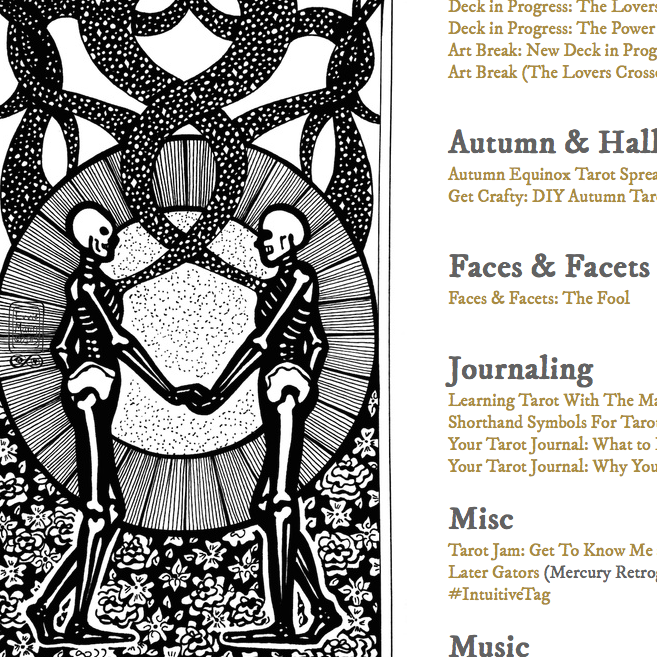This is the fourth post in a series on dream journaling. In the last post, I covered techniques for committing to your dream journal without spending all day on it. Now it’s time to go deep and talk about handling the ugly, heavy, and difficult material our dreams dredge up.
1. Be Honest. Accept Your Shadow:
It’s tempting to gloss over everything that makes us uncomfortable, and only preserve our most bright and beautiful dreams, but we miss so much when we refuse to view our mental landscape with honesty and balance.
Editing out too much unpleasant or disinteresting material can diminish your overall dream recall, and make it harder to remember the good dreams. It also costs opportunities to face and learn from uncomfortable truths.
Like waking life, dreaming is a mixed experience. Sad and frightening dreams can be beautiful, cathartic, and wise in other ways. They’re often worth hearing out.
2. It is OK to Not:
That said, we all carry different hangups and traumas. We all experience nightmares and disturbing dreams at times. Handling our worst dreams can be tricky and unpleasant.
Some people have more difficult dream lives than others. If you have frequent nightmares or traumatic flashbacks in your dreams, it might be helpful to unpack them with help from a qualified and trustworthy counsellor, loved one, or support group.
Dream journaling and improving dream recall may be too difficult or unpleasant for some, and that’s okay. Don’t pressure yourself to keep up a dream journal if it’s not for you. It doesn’t make you lesser-than in any way—spirituality, artsiness, witchiness, whatever-you’re-trying-to-get-out-of-this-ness—if this practice doesn’t click, or isn’t healthy for you. Your preferences, needs, and limits matter.
If it is constructive for you to keep journaling, several strategies can help when dreams get rough:
3. Trigger Warnings:
Write the same kind of content or trigger warnings you’d ask for in classes or conversations at the top of your entry along with the title.
4. Mood Notes:
Reading back over old dream journals can prompt vivid memories, and pull you back into whatever mood you experienced during the dream. For particularly emotional dreams, add notes at the beginning of the description, like sad, bittersweet, or very angry. If these emotions pertain to a particular situation or relationship, you might add a name, initials, or brief descriptor right after the mood note. That way, if you don’t have emotional bandwidth to re-feel the heavy stuff, you’ll know what to gloss over, and if you’re scanning back to confront a specific issue, those dreams will be easier to find.
5. Storytime:
When a dream is disturbing but worth digging into, making interpretations can help process that imagery. Try to view the dream with a slightly detached perspective. Instead of viewing it as something you experienced directly, imagine you were playing a character in a show. The character isn’t you, the play is over, you’ve stepped back out of character, and now you can review and critique the scene. It wasn’t real, it was a story. What were the characters’ motivations, what were the running themes, and what was the writer/director trying to say?
It’s tempting to gloss over everything that makes us uncomfortable, and only preserve our most bright and beautiful dreams, but we miss so much when we refuse to view our mental landscape with honesty and balance.
Editing out too much unpleasant or disinteresting material can diminish your overall dream recall, and make it harder to remember the good dreams. It also costs opportunities to face and learn from uncomfortable truths.
Like waking life, dreaming is a mixed experience. Sad and frightening dreams can be beautiful, cathartic, and wise in other ways. They’re often worth hearing out.
2. It is OK to Not:
That said, we all carry different hangups and traumas. We all experience nightmares and disturbing dreams at times. Handling our worst dreams can be tricky and unpleasant.
Some people have more difficult dream lives than others. If you have frequent nightmares or traumatic flashbacks in your dreams, it might be helpful to unpack them with help from a qualified and trustworthy counsellor, loved one, or support group.
Dream journaling and improving dream recall may be too difficult or unpleasant for some, and that’s okay. Don’t pressure yourself to keep up a dream journal if it’s not for you. It doesn’t make you lesser-than in any way—spirituality, artsiness, witchiness, whatever-you’re-trying-to-get-out-of-this-ness—if this practice doesn’t click, or isn’t healthy for you. Your preferences, needs, and limits matter.
If it is constructive for you to keep journaling, several strategies can help when dreams get rough:
3. Trigger Warnings:
Write the same kind of content or trigger warnings you’d ask for in classes or conversations at the top of your entry along with the title.
4. Mood Notes:
Reading back over old dream journals can prompt vivid memories, and pull you back into whatever mood you experienced during the dream. For particularly emotional dreams, add notes at the beginning of the description, like sad, bittersweet, or very angry. If these emotions pertain to a particular situation or relationship, you might add a name, initials, or brief descriptor right after the mood note. That way, if you don’t have emotional bandwidth to re-feel the heavy stuff, you’ll know what to gloss over, and if you’re scanning back to confront a specific issue, those dreams will be easier to find.
5. Storytime:
When a dream is disturbing but worth digging into, making interpretations can help process that imagery. Try to view the dream with a slightly detached perspective. Instead of viewing it as something you experienced directly, imagine you were playing a character in a show. The character isn’t you, the play is over, you’ve stepped back out of character, and now you can review and critique the scene. It wasn’t real, it was a story. What were the characters’ motivations, what were the running themes, and what was the writer/director trying to say?
6. Change The Story:
If you’re able to dream lucidly, you can go back into bad dreams, take control, and change what happens. If you’re not able to dream lucidly, you can still do this when you wake up, through your imagination. Picture the landscape and scenario you were in, imagine yourself back there, and review everything you’d change to make the dream better, and to undo the worst of it. Visualize these changes, and create a peaceful and satisfying resolution.
Know that whatever you would choose to make that dream better, whatever you imagine to fix it, reflects more on who you really are than the troubling dream did. Do this right when you wake up from your bad dream, while it’s still fresh, before you get out of bed or write anything down.
In using these last two approaches over time, my troubling dreams feel less and less frightening and intense. Even if I’m not lucid within these dreams, I find I can pass through them with a degree of observational detachment that makes them less troubling in real time than they might have been when I was younger. My dreams are still a mixed bag, like anyone’s, but I code fewer things as nightmares now than in the past.
7. Know What Not To Record:
Every guideline has its exceptions, and some dreams are just not worth preserving, shadow-work be damned. That line is going to look different to different people, and you’ll have to use your own discernment on what bears excluding from your journals.
Think of it like a sliding scale from 1 to 10, where 1 is the most amazing dream you’ve ever had, and 10 is your worst nightmare. I don’t record my 10’s. I’ll write something like “bad nightmare, don’t want to keep” instead. Some images aren’t worth revisiting, no matter what they might say.
It is worth noting when you’ve had a nightmare, even if you cut the description. Having frequent nightmares can point to problems that might be addressed. These may or may not not be psycho-spiritual issues—they can be inelegantly practical. For example, eating, watching, or reading the wrong thing too close to bed can trigger nightmares.
Here’s a personal example: I have Celiac disease, and one of my flare-up symptoms is terrible nightmares. Certain dreams are a sure sign I’ve been exposed to gluten. These are 10’s on my sliding scale, and they can been physically painful as inflammation hits my body. I don’t want to recall them, but I do want to note when they happen so I can ID their source and eliminate it. (If you have frequent nightmares that are physically painful, it might be wise to speak to a doctor. That pain could be in your body, not just your dreams.)
I also keep descriptions of recurring stress dreams very brief: “back in school, don’t know where my classes are”, or “back at XYZ old job, ringing up a never-ending sale.” Again, it’s worth noting when these dreams pop up, but I already know what they mean, and their specific imagery doesn’t reveal much new. They’re not worth extra time.
Similarly, old acquaintances can resurface in our dreams—folks we don’t care to lend more time or power. It’s fine and dandy to say “nope—you don’t get to be in my book” when they come around. The ability and choice to shoo them off can be the message in itself.
Finally, this verges on superstition, but if your intuition screams at you not to write something down, honor that instinct, no matter how it hits you emotionally, be it terrible, tricky, or sweet. You may feel silly leaving something out because it spooked you, or it feels disrespectful to a dream landscape or character to write it down, but go with your gut for peace of mind if nothing else. This might look like omitting a small detail, like a name or trait, or it might mean omitting an entire dream.
Words have power and dreams are weird. If ever folklore and your gut instinct team up to tell you the same thing, heed your knowing.
If you’re able to dream lucidly, you can go back into bad dreams, take control, and change what happens. If you’re not able to dream lucidly, you can still do this when you wake up, through your imagination. Picture the landscape and scenario you were in, imagine yourself back there, and review everything you’d change to make the dream better, and to undo the worst of it. Visualize these changes, and create a peaceful and satisfying resolution.
Know that whatever you would choose to make that dream better, whatever you imagine to fix it, reflects more on who you really are than the troubling dream did. Do this right when you wake up from your bad dream, while it’s still fresh, before you get out of bed or write anything down.
In using these last two approaches over time, my troubling dreams feel less and less frightening and intense. Even if I’m not lucid within these dreams, I find I can pass through them with a degree of observational detachment that makes them less troubling in real time than they might have been when I was younger. My dreams are still a mixed bag, like anyone’s, but I code fewer things as nightmares now than in the past.
7. Know What Not To Record:
Every guideline has its exceptions, and some dreams are just not worth preserving, shadow-work be damned. That line is going to look different to different people, and you’ll have to use your own discernment on what bears excluding from your journals.
Think of it like a sliding scale from 1 to 10, where 1 is the most amazing dream you’ve ever had, and 10 is your worst nightmare. I don’t record my 10’s. I’ll write something like “bad nightmare, don’t want to keep” instead. Some images aren’t worth revisiting, no matter what they might say.
It is worth noting when you’ve had a nightmare, even if you cut the description. Having frequent nightmares can point to problems that might be addressed. These may or may not not be psycho-spiritual issues—they can be inelegantly practical. For example, eating, watching, or reading the wrong thing too close to bed can trigger nightmares.
Here’s a personal example: I have Celiac disease, and one of my flare-up symptoms is terrible nightmares. Certain dreams are a sure sign I’ve been exposed to gluten. These are 10’s on my sliding scale, and they can been physically painful as inflammation hits my body. I don’t want to recall them, but I do want to note when they happen so I can ID their source and eliminate it. (If you have frequent nightmares that are physically painful, it might be wise to speak to a doctor. That pain could be in your body, not just your dreams.)
I also keep descriptions of recurring stress dreams very brief: “back in school, don’t know where my classes are”, or “back at XYZ old job, ringing up a never-ending sale.” Again, it’s worth noting when these dreams pop up, but I already know what they mean, and their specific imagery doesn’t reveal much new. They’re not worth extra time.
Similarly, old acquaintances can resurface in our dreams—folks we don’t care to lend more time or power. It’s fine and dandy to say “nope—you don’t get to be in my book” when they come around. The ability and choice to shoo them off can be the message in itself.
Finally, this verges on superstition, but if your intuition screams at you not to write something down, honor that instinct, no matter how it hits you emotionally, be it terrible, tricky, or sweet. You may feel silly leaving something out because it spooked you, or it feels disrespectful to a dream landscape or character to write it down, but go with your gut for peace of mind if nothing else. This might look like omitting a small detail, like a name or trait, or it might mean omitting an entire dream.
Words have power and dreams are weird. If ever folklore and your gut instinct team up to tell you the same thing, heed your knowing.
I hope you’re enjoying this series, and that these tips are helpful for you. Bonding with your dreamscapes can work wonders for your creative drive and your tarot skills! I’ve got one last post coming up on putting it all together, reviewing, and interpreting your dreams. After that, we’ll get back to some tarot. Thanks as always for reading, and be well!











 RSS Feed
RSS Feed
